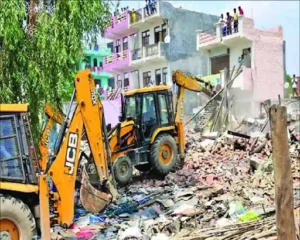Introduction
- Recently, the Supreme Court of India condemned the growing trend of ‘Bulldozer Justice’, where properties are being demolished as a form of punishment for criminal accusations.
- The court has put a stay on these demolition drives until October 31, emphasizing that demolishing properties solely based on criminal allegations is not justifiable.
Definition
- Bulldozer Justice refers to the controversial use of bulldozers to demolish properties of individuals accused of serious crimes such as communal violence, murder, or rape.
- This action is often criticized for bypassing legal procedures, violating due process, and being used as a punitive measure by state authorities.
Read also: Andaman and Nicobar (A&N) Islands : Location, History and Significance | UPSC

Instances of Bulldozer Justice
Uttar Pradesh:
-
- Since 2017, properties of individuals accused of serious crimes, such as gangster Vikas Dubey and Atiq Ahmed, have been demolished.
Madhya Pradesh:
-
- In Khargone, 16 houses and 29 shops were demolished following communal clashes.
Haryana:
-
- After communal violence in Nuh, bulldozer actions were initiated against the properties of alleged culprits.
Maharashtra:
-
- In Mumbai, a part of actress Kangana Ranaut’s bungalow was demolished following her controversial remarks about the city.
Delhi:
-
- Post-communal clashes in Jahangirpuri in 2022, bulldozer justice was reported in the demolition of local properties.
Arguments in Favor of Bulldozer Justice
Legal Compliance:
-
- State governments claim that actions are conducted as per municipal laws governing illegal constructions. For example, the Uttar Pradesh government references the U.P. Municipal Corporation Act and U.P. Urban Planning and Development Act.
Deterrence Against Crime:
-
- Governments argue that demolitions serve as a strong deterrent against illegal activities and help maintain public order.
Restoration of Law and Order:
-
- In states like Haryana, bulldozer actions are justified as necessary to restore order after communal violence, such as the Nuh clashes.
Non-Discriminatory:
-
- Authorities assert that these demolitions are not aimed at any specific community, including properties owned by Hindus, such as in Madhya Pradesh.
Public Demand:
-
- Bulldozer actions are seen as responding to public demand for swift and visible action against criminals, as argued by proponents.
Concerns with Bulldozer Justice
- Violation of Rule of Law: Demolishing properties without due legal process violates basic tenets of law, such as serving notice and giving the accused a right to representation.
- Violation of Fundamental Rights: The Right to Shelter, part of the Right to Life under Article 21 of the Indian Constitution, is violated when homes are demolished without proper legal recourse.
- Presumption of Innocence: Demolishing properties of individuals accused of crimes undermines the principle of being presumed innocent until proven guilty.
- Targeting of Minorities: Reports suggest that minorities, particularly Muslims, are disproportionately affected by these demolitions. For instance, Amnesty International reported that between April and June 2022, 128 properties owned primarily by Muslims were demolished.
- Encouraging Authoritarianism: Critics argue that bulldozer actions represent a shift toward authoritarianism, with authorities using it as a tool of political retribution.
- Ethical Issues: The lack of separation between executive power and judiciary in bulldozer justice, along with innocent family members being affected, raises serious ethical concerns.
Supreme Court Observations on Demolitions
- Maneka Gandhi vs Union of India (1978): The Supreme Court held that government procedures must be fair, just, and reasonable.
- Municipal Corporation of Ludhiana vs Inderjit Singh (2008): The court ruled that no demolitions should occur without serving proper notice and hearing the occupant.
- Olga Tellis vs Bombay Municipal Corporation (1985): The court ruled that eviction without notice violates the right to livelihood under Article 21.
- Punjab & Haryana High Court (Nuh Case): Intervened to halt demolitions in Nuh, citing lack of due process and possible ethnic bias.
Read also: Political Majority Vs Legislative Majority | UPSC
Way Forward
- Pre-demolition Surveys: A thorough survey should precede demolitions, as mandated by the Supreme Court, to ensure lawful execution. Proper notice must be served in advance.
- Pan-India Guidelines: Uniform procedural guidelines should be incorporated at the national level, outlining steps for pre-demolition, during demolition, and post-demolition actions.
- Shifting Burden of Proof: The responsibility should be on the authorities to justify demolition actions to protect individuals’ right to shelter.
- Independent Review Mechanism: Judicial and civil society representatives should review proposed demolitions to ensure legality and fairness.
- Focus on Rehabilitation: Guidelines must ensure the rehabilitation of innocent families affected by bulldozer actions, aligning with international human rights standards on adequate housing and compensation for forced evictions.
